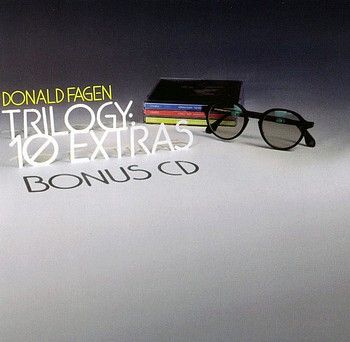
Ah now, we're talking - it's time for some insanely musically and technically skilful cynicism couched in the guise of smooth pop. After Steely Dan split Donald Fagen immediately got to work on a solo album, and, unusually for Fagen he didn't spend years perfecting it. The Nightfly (1982) is a superb piece of nostalgic jazz-pop of a proficiency that makes most pop records sound like a bad joke. It's smooth, certainly, jazzy for sure, but this is such pitch perfect songwriting that whatever the style, it would always be great. In some ways it's a personal record, apparently reflecting Fagen's own anticipations of the future when he was a teen in the 50's and 60's, but whatever the motivations and the lyrical diversions (which are far more direct than anything he wrote for Steely Dan) it's an album of almost impossible keenness and it's easy listening in the best of senses. Stylistically it's the next step on from Steely Dan's increasingly smoothed out jazziness, but The Nightfly takes out a lot of the biting cynicism and leaves just a healthy enough dose to make sure that the album doesn't become anodyne.

Over ten years later it's more of the same, but with an even more absurdly tehnically precise production, with 1993's Kamakiriad (or, as one bloke interviewed in Mojo brilliantly said, when asked what his album of the year was, "That new Donald Fagen one, what's it called? Caramac, that's it"). The jazzy arrangements on Kamakiriad are more ornate and madly ambitious than ever before and the technology available to Fagen meant that he could also make a cleaner, shinier, more clinically exact record than ever. That's not to do it down though, it's another startlingly smart set of pristine jazz-pop songs that feel more brittle than anything he's recorded and in many ways it's closer in spirit to the last two Steely Dan albums than The Nightfly. These are beautifully constructed songs and Fagen's waery voice drips cynicism more clearly than it has for a long time, even when singing what seem to be some of his smoothest, least threatening tunes. It's clearly not up to the standard of The Nightfly but Fagen's quality control is uniformly high so Kamakiriad is hardly a failure by not being as good as its predecessor.

Another 13 years pass before the next Fagen album, Morph the Cat (2006), which sees him return to a more direct lyrical approach, probably the most interpretable he's ever been in fact. It's no surprise therefore to find that most of the songs, lyrically at least, are pretty morbid, being preoccupied with mortality pretty much throughout. However, that's not to say that the songs aren't the usual jaunty, jazzy, snarky, sarky stuff that he always comes up with, and the album is easily better than the Steely Dan reunion albums released in the 1990's and 2000's. It's the best thing that Fagen has worked on since The Nightfly in fact, and although stylistically he's never going to come up with anything surprisingly different or new, it's amazing that he can still get such top-flight material from his jazz-pop template. A box set with the "trilogy" of albums was released that contained a bonus disc of B-sides, live and rare material relating to the recording of the three albums and although there's nothing to write home about on it, it's a pretty interesting document, revealing just how Fagen's choices of what makes the cut are made.


From tomorrow it's business as usual, less hassle, and, oh yes, a whole lot of Fairport...
No comments:
Post a Comment